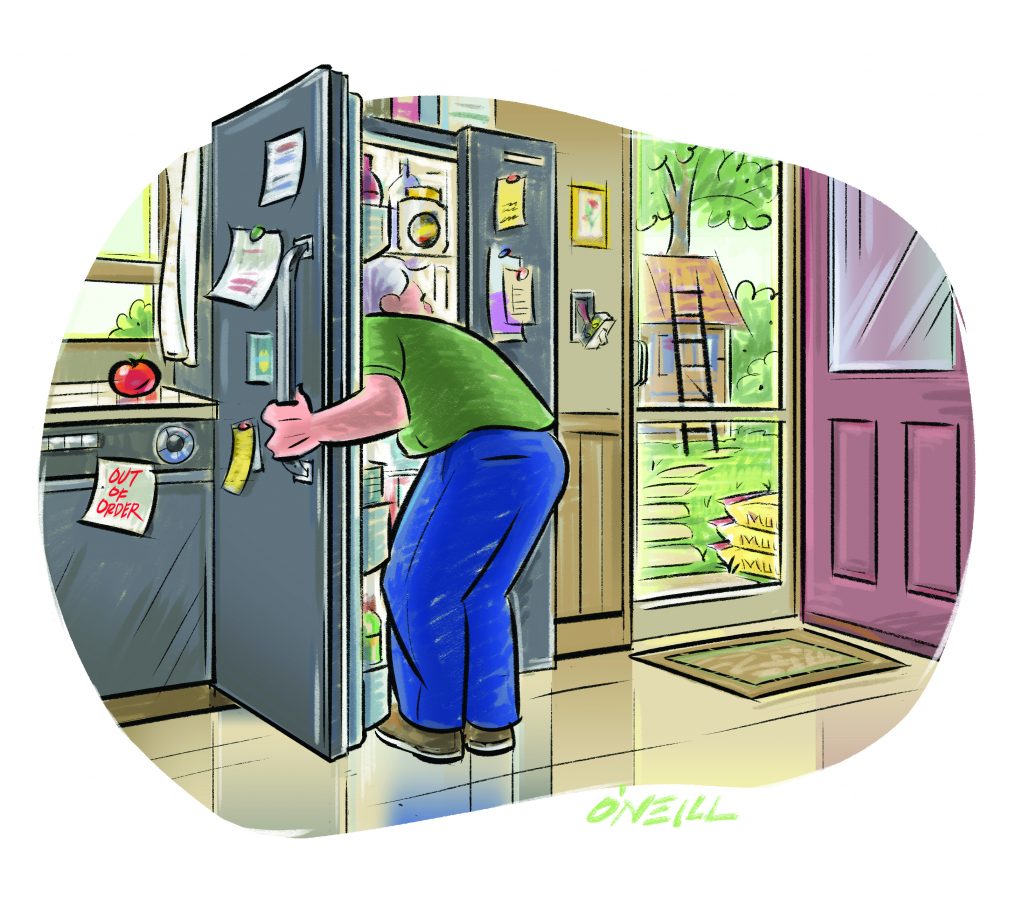Decades into marriage, this columnist finds that even unconditional love has its own set of conditions — Recurring Refrigerator Blindness Syndrome among them.
by Jim Dodson | illustration by Gerry O’Neill

Wives, does your husband suffer from RRBS, also known as Recurring Refrigerator Blindness Syndrome?
The symptoms are relatively easy to diagnose. Your husband is making himself the first locally grown tomato sandwich of the season and opens the refrigerator in search of Duke’s Mayonnaise. He scans the refrigerator shelves for three full minutes, increasingly agitated as he shifts jars of pickles and containers of mystery meat and cottage cheese hither and yon.
Finally, after shifting the contents of the entire refrigerator around and even checking the vegetable and meat bins for the missing mayonnaise, he straightens up and loudly declares one of two things:
“This is ridiculous! I know we have mayonnaise! I saw it in here yesterday!”
Or, alternatively, with a wail of wounded resignation: “Honey, where’s the G#%@* mayonnaise? You said you just bought a brand-new jar this week. Someone must have taken it!”
Commonly, what happens next is the victim’s wife calmly appears, opens the refrigerator and, within seconds, presents the aggrieved spouse with a fresh new jar of Duke’s. Turns out, the mayonnaise was partially hidden behind a carton of orange juice last used by said victim, apparently in plain view only to the average female person.
If you live in my house, this happens on an almost daily basis.
Yes, I suffer from Recurring Refrigerator Blindness Syndrome.
But I am not alone.
There are untold millions of us out here who suffer instantaneous blindness whenever we open the refrigerator in search of condiments, cold pizza, leftover mac and cheese or the last piece of chocolate meringue pie.
Moreover, according to the National Association of Endangered Domestic Tranquility, refrigerator blindness isn’t the only condition that strikes the average married American male, placing undue stress on relations with wives, visiting mothers-in-laws and elderly aunts.
Tranquility experts cite a commonly related condition known as DAS or Dishwasher Avoidance Syndrome that afflicts an estimated 87% of men married an average of 10 years or more. DAS is defined as a chronic inability to correctly load and unload (much less operate) a German-built dishwasher without proper supervision by someone familiar with the machine’s standard operating procedures, typically a married person of the female persuasion.
Sufferers generally avoid this everyday household task by poorly hand-washing dirty dishes and used glassware whenever the domestic partner is out of the house, not only resulting in suspiciously spotted dishware but unnecessary use of precious water. A related inability to operate the average washing machine and reach into a clogged garbage disposal have also been documented in some cases.
In addition, studies conducted on the average suburban American male reveal at least two other common stress-inducing habits that take place outside of the home.

The first is LGLP or Lost Grocery List Phenomenon, generally affecting mature to elderly husbands who volunteer to go to the store for their wives with a list of a dozen essential items and return hours later with chips, salsa, three or more frozen pizzas, a six-pack of craft beer, the wrong dishwasher liquid, a set of half-price blinking Christmas lights, four Tahitian patio sconces, a tub of rainbow sherbet, Dale Earnhardt Jr.’s Guide to Home Auto Repair (sixth edition) and only four of the 12 items on the original list, which was somehow lost in transit to the store. An unsupervised return to the store is sometimes undertaken with a revised shopping list safety pinned to the sufferer’s sweater.
Finally, there is the all-too-common domestic problem of UHIC, better known as Unfinished Home Improvement Complex, an affliction in which various do-it-yourself home projects have been sitting idle, unfinished or simply forgotten since the first Obama administration. This includes, but is not limited to: half-tiled bathroom walls, toilets that don’t properly flush, mountains of pricey hardwood mulch left in the backyard so long they’re sprouting trees, doors that never quite close, suspicious sounds beneath the house, broken doorbells, half-installed home security systems and driveway sinkholes.
Curiously, in the interest of saving time and money, the typical victim of UHIC routinely stalks the aisles of Lowe’s or Home Depot, dreaming up ambitious new home improvement projects that will make home life easier but don’t stand a chance of ever being completed.
Yes, wives, you know these conditions all too well.
Sadly, there’s no known cure for any of these domestic maladies just yet. But there is hope in the form of a newly created self-help grassroots organization called Building Better Husbands, designed to afford hard-working wives like you the opportunity to network and share creative ideas on how to make their homes happier places and spouses more thoughtful and responsive. Look for chapters forming in your neighborhood soon. BYOB (or two).
A final word to my fellow sufferers.
This Mother’s Day, fellas, let’s give the little lady of the house a break by picking up the slack on normal domestic duties, finishing those pesky home projects, even reading the appliance operating instructions and learning to go to the grocery store only once without a list pinned to your golf shirt.
Meantime, it’s probably best to avoid calling your wife “the little lady.”
Some old habits die hard, I guess.
This article originally appeared in the May 2024 issue of WALTER magazine.




